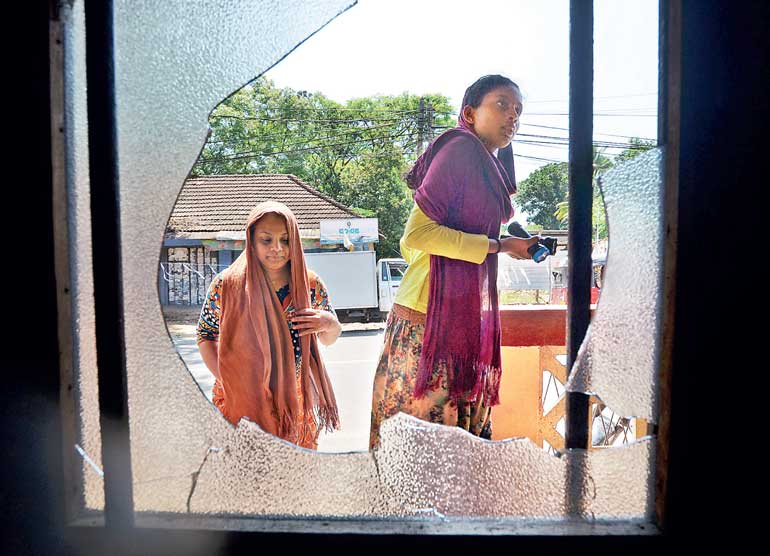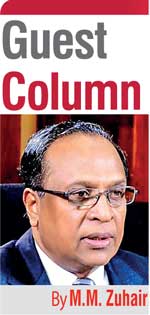Monday Feb 16, 2026
Monday Feb 16, 2026
Saturday, 21 January 2023 00:10 - - {{hitsCtrl.values.hits}}

A country in economic dire straits or even otherwise, cannot afford to allow anyone to create divisions amongst or within communities that may lead to costly conflicts – Pic by Shehan Gunasekara
 There are deep concerns within the Muslim community on the ongoing state of hostility or cold war between certain State institutions and the country’s Muslim community including its long-cherished institutions. The subjective belief appears to centre around the universally condemned Easter Sunday attacks of 21/04/2019 continuing to be exploited by vested interests to cage the community and its institutions even after close upon four years of the 21/4 disaster, which the community had condemned and disassociated itself unequivocally!
There are deep concerns within the Muslim community on the ongoing state of hostility or cold war between certain State institutions and the country’s Muslim community including its long-cherished institutions. The subjective belief appears to centre around the universally condemned Easter Sunday attacks of 21/04/2019 continuing to be exploited by vested interests to cage the community and its institutions even after close upon four years of the 21/4 disaster, which the community had condemned and disassociated itself unequivocally!
Such hostile impositions are discriminatory and appear to be part of the anti-minority moves that began as hate campaigns in an organised manner in 2012. The role of war mongering foreign hands and their agents in progressively alienating and radicalising the country’s Muslims need to be kept under close watch. Prompt rectifications of matters perceived by the disgruntled youth as continued injustice may help prevent some of them becoming pawns in foreign organised disastrous counter moves. A country in economic dire straits or even otherwise, cannot afford to allow anyone to create divisions amongst or within communities that may lead to costly conflicts.
The community is distressed that Muslims, the community’s religious dignitaries both past and present, its historic institutions and its civil society have been continuously singled out for damaging coercive action. Such actions may be seen by the UNHRC mechanisms as oppressive and in violation of the Constitution of Sri Lanka as well as contrary to many multiple international treaties. Terrorists and criminals are one thing and the community and its institutions are another!
The Aragalaya activists for instance cannot be dealt with as terrorists, though the country needs peace and social order. It is vital that the national political leaders learn lessons from the rise of the LTTE from amongst two prominent minorities in north Sri Lanka in the 1970s, the uprisings of 1971 and 1989 from the majority community and avoid creating confrontational issues with the Muslim minority, though it has not shown any capability to mount even a simple street protest!
With a pacifist political and business leadership at the helm of this community, oppressive actions on sensitive religious cum cultural issues could create new radical elements prone to violence. This country cannot afford to push anyone into violence! Hence the need to resolve these issues expeditiously.
The following are some of the instances, though there are many others, which require the urgent attention of the Government in the interest of justice and fair-play on the one hand and ensuring unity and promoting trust amongst the communities on the other:
1) Muslim civil society and religious dignitaries silenced: State mechanisms have been continuously used, often without any legal mandate to openly enter and survey a number of Muslim civil society organisations without any complaint or court warrants.
These regular visits and phone calls have had the effect of silencing Muslim organisations and reducing their services to the community and the country. UN High Commissioner for Human Rights (UNHCR) had identified the State institutions which had indulged in action violative of the freedom of association and freedom of expression in this regard. Lately a number of respected Muslim religious intellectuals have also been questioned by State institutions, which the UNHRC may consider as unwarranted harassment. In the circumstances Government must consider all State institutions being made accountable to Parliament, in the backdrop of allegations that some suicide bombers were also funded by certain State institutions, though the allegations may be unfounded.
2) Prosecutions only against Muslims: The Parliamentary Select Committee on Easter Sunday attacks in its Report (page 93 onwards) dated 23 October 2019 and the Presidential Commission of Inquiry in its Final Report (pages 361/2) dated 31 January 2021 have blamed the majoritarian extremism in the country, ‘igniting majoritarian extremist groups to attack Muslims, escalating the latter into violent extremism resulting in the Easter Sunday attacks’. But the prosecutions and actions taken by the Police Department and the Attorney General’s Department were so far, only against the Muslim minority with no prosecutions as per the said reports, against those who ignited and contributed to anti-Muslim violence in Aluthgama (2014), Gintota (2017), Ampara (2018), Digana (2018), etc. The State and its forces must guarantee on the ground that minorities are protected from majoritarian extremism. That is the best guarantee against minority extremism.
3) Cold war on the Muslims under cover of Easter attacks: Meanwhile the Easter attacks were extensively and unjustifiably used with widespread indiscretion to blame Islam, its teachings, the Holy Quran, Islamic books, respected foreign and local Islamic scholars, the mosques, the madrasas, Muslim marriage laws, the Wakf Act, Muslim civil organisations, in other words the Muslim community as a whole, in order to cover up the majoritarian extremist violences, which according to the findings of the two reports referred to earlier, contributed to the 21/4 Easter Sunday’s avoidable disaster. The reports had also recommended (page 372) that “the Government should take concrete steps to identify the root causes of religious intolerance and tension and promote trust among the different ethnic and religious communities…” It must be noted that under cover of the Easter attacks, a cold war on the Muslim community as a whole appears to be going on, often below the radar. This undeclared war on the believers of Islam in Sri Lanka may radicalise and compel some within the community to seek relief from the United Nations Human Rights Council (UNHCR). We need help to stop them.
4) Criminal negligence in failing to avert 21/4: A serious matter continuously raised by the church leaders in Sri Lanka was that, though there were adequate time and opportunity to avert the 21/4 Easter attacks, those responsible for taking action to arrest and prevent the multiple suicide attacks criminally neglected for over 16 days to take any preventive action whatsoever to avert the terror attacks. According to a page 1 lead story published in the Lankadeepa daily of 11 February 2022, the CID itself has reported to Court that the then ‘CID did not act to avert the Easter attacks though it had the opportunity to do so’ and also ‘to arrest and prevent suicide bomber Zahran Hashim’ from carrying out the disastrous mission!
5) Attack on ‘Monotheism or Thowheed’ or ‘Wahabies’ is attack on Islam: There are recent attempts by some State officials to blame the ‘unitary or oneness of Allah’ known as ‘Thowheed’ as distinguished from the Christian concept of ‘Trinity’ as an extremist ideology, though “Thowheed” or belief in the singleness or oneness of Allah is a fundamental part of the Islamic belief of every Muslim, including those Muslims divisively named as ‘sufis’ and certain others derogatively named as ‘wahhabis’ (Muwahhideens). These operations are in violation of Article 10 of the country’s Constitution. There are also attempts to defame the well-known Saudi Arabian Islamic Scholar Muhammed Ibn Abdul Wahab (1703-1787) and other scholars and Islamic organisations here and in India as spreading extremist ideology, without quoting a single sentence from any of Abdul Wahab’s or other scholars’ “original” works in support of any of these allegations. These allegations are futile attempts to shield and side track the globally well-known Western war mongers’ hate Islam-hate Muslims campaigns foolishly followed here by a few hate campaigners in Sri Lanka. These are unacceptable attempts to divide the majority from the minorities and presently also to create divisions within Sri Lanka’s small Muslim community.
6) Discriminatory restrictions: Muslims are undergoing tremendous hardships for instance to import the Holy Quran and other Islamic books due to discriminatory restrictions imposed only on Islamic texts. The well-known “Peace TV” of Dr. Zakir Naik, a reputed Islamic scholar, has been restricted in violation of the right of the Muslims to receive information whereas anti-Muslim Indian channels can be viewed in Sri Lanka engaged in divisive hate campaigns.
7) Islamic school texts compelled to be edited: Islamic textbooks used by Muslim students in schools have been allegedly compelled to be edited by persons without knowledge of Islam or respect for the religion in violation of the Constitution. These are impediments directed only against Muslims, although there is a constant process of Islamic educators regularly improving the texts.
8) North east: The issues facing the Tamil community need to be resolved. In doing so, the Eastern Muslims ought not to be imposed with new problems. The injustices caused during the reign of the LTTE such as the land grabs from Eastern Muslim farmers, etc. require redress.
9) Building approved by Cabinet in 1999 for Muslim affairs being divested: The then proposed building approved in 1999 by the Cabinet headed by President Chandrika Bandaranaike Kumaratunga on a proposal by SLFP stalwart Lakshman Jayakody then Minister of Cultural Affairs to be set apart for the Ministry of Muslim Affairs is being currently divested at the instance of the Ministry of Buddhasasana to be shared with other institutions outside State Muslim Affairs. This is being coercively pursued in violation of and by suppressing the 1999 Cabinet approval. The building presently accommodates the Department of Muslim Religious and Cultural Affairs. Several State institutions connected to Muslim affairs such as the Board of Quazis, Quazi Courts in Colombo, Haj Committees, Advisory Board under sections 6 & 7 of the Muslim Marriage & Divorce Act (MMDA), etc., require reasonable accommodation for their functions. The Wakf Board, the Wakf Tribunal and the Department of Muslim Affairs also need additional space for their activities. Persons who travel to Colombo to attend these institutions do not have sufficient space for attending to their official matters. Why is the Minister of Buddhasasana Vidura Wickremanayake wanting to take away what was physically given in 2000 for Muslim Affairs through his father, then Prime Minister Ratnasiri Wickremanayake? The Buddhasasana Ministry must decline to handle matters relating to the cultural and religious issues of Hindus, Muslims and Christians and avoid creating contentious issues with the minorities.
10) Official not conversant in mosque matters appointed as additional director of Muslim affairs: In a shocking move a respected lady officer belonging to the Christian faith has been appointed as Addl. Director of the Muslim Affairs Department. Her competency to manage issues relating to Islamic religious, Muslim cultural and mosques issues is itself an issue. Three Muslims more competent to deal with these matters have been overlooked. She has not accepted this office as yet.
11) Arrested Muslims in custody for over 3½ years without bail or fair trial: It is a known fact that the 21/4 attacks were extensively used to arrest and detain for months over 2,000 Muslims, though most of them were released later as they had nothing to do with the Easter bomb attacks. Over 75 of the arrested Muslims are still in custody for over 3¾ years without the AG consenting to bail in most cases, allegedly depriving those indicted of a fair trial.